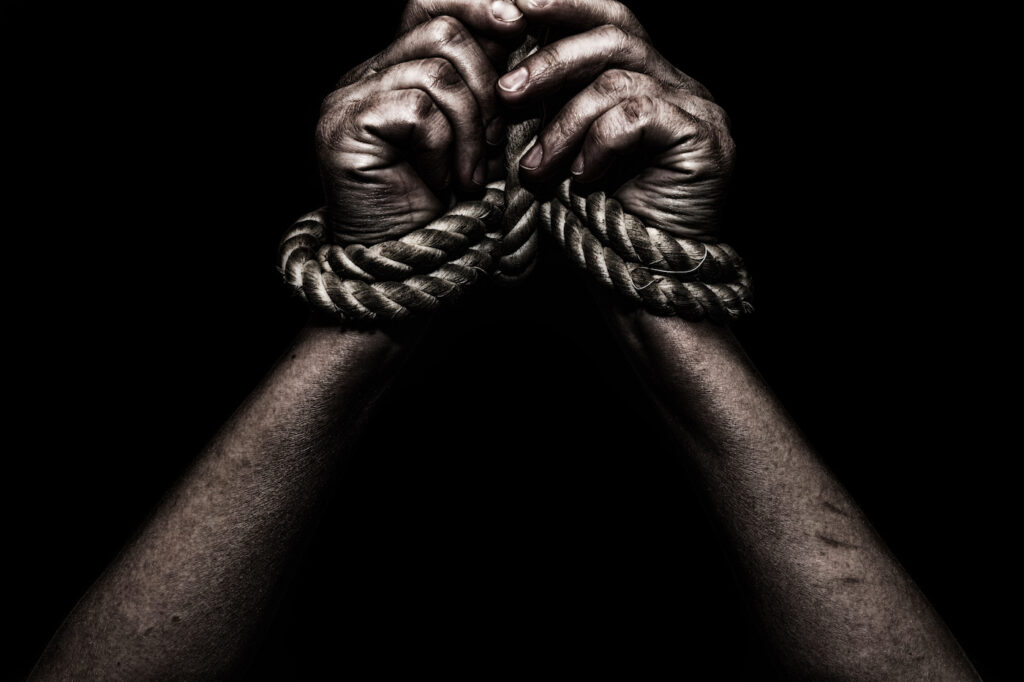It has been said that racism is America’s original sin. As both reality and a metaphor for racism, original sin is replete with meaning: racism is a wrong that violates the universal moral law; it extends back to America’s earliest days; its effects are widely shared in the population; it persists; it can be overcome and healed through repentance, penance, and forgiveness; and it finds its meaning in relationship to God. These are the building blocks of my case for public measures of repair for America’s history of racial injustices.
These measures include the US federal government carrying out a public apology and financial reparations for past racial injustices, as well as a seldom-voiced reciprocal measure: collective forgiveness on the part of African American leaders. The foundations of my case are natural law—norms known through reason such as natural rights, human dignity, equality, apology, and restitution—as well as biblical teachings that deepen these norms and add distinctive ones such as forgiveness and reconciliation. Thus rooted, these measures might bring redemption and healing to a nation still wounded and divided by its original sin.
The central case for reparations is justice in this fundamental sense: African Americans today are due to receive them on account of the colossal wrongs that their forebears suffered.
Past injustices merit public acts of reparation, which are measures of justice. This may sound anodyne, but the many ends that proponents and opponents invoke for and against reparations (diversity, equity, inclusion, and the economic and educational advancement of African Americans) end up obscuring what justice actually demands. These ends and the best means of attaining them are worth debating and do bear upon justice, but the central case for reparations is justice in this fundamental sense: African Americans today are due to receive them on account of the colossal wrongs that their forebears suffered.
Start your day with Public Discourse
Sign up and get our daily essays sent straight to your inbox.Three Stages of Injustice
These wrongs fall into three episodes, the first two of which are broadly familiar to Americans. First is slavery—chattel, racialized slavery—which was practiced legally from 1619 through 1865. Scholars estimate (here and here) that 10 million slaves inhabited the United States in this period, 40 percent of whom were living at the outbreak of the US Civil War in 1861, and that they performed 410 billion hours of labor.
Second is the period of Jim Crow, spanning from the end of the Civil War in 1865 and especially the end of Reconstruction in 1877 up through the civil rights legislation that the US Congress passed in 1964 and 1965. Laws, policies, and extra-legal obstruction in seventeen states promoted discrimination in myriad forms and prevented African Americans from developing economically; governments at all levels selectively enforced laws against violence and intimidation against African Americans; and the whole system was sustained by fear: more than 4,000 African Americans were lynched across 800 counties between 1877 and 1950.
The third, which may be called “distributive discrimination,” is less well known and consists of vast transfers of wealth through the New Deal and the Fair Deal from the 1940s to the 1960s, and housing policies from the 1930s through the 1960s, that largely excluded African Americans in their design and administration and thus perpetuated and widened racial disparities in wealth, education, home ownership, and opportunities to hold a job or start a business.
These injustices assaulted natural rights and the dignity of persons made in the image of God on which these rights are based. They leave behind wounds, the most central of which is what I have termed the standing victory of injustice, the moral fact of injustice itself that persists in time unless it is repudiated. While constitutional amendments, legislation, and policies have countered and delegitimated these injustices, the lack of a formal apology and reparations has left them still standing.
Other wounds, racial disparities and forms of structural racism, also persist. The most dramatic of these is the gap in wealth between African Americans and whites, which averages about $240,000 per individual and remains high when marriage and educational attainment are controlled for. The income and wealth of African Americans have grown since 1970 but the gap between them and those of white Americans has not narrowed. Both data on the population and experimental studies show large disparities between blacks and whites in incarceration rates; health profiles; the ability to attain employment, bank loans and home loans; and rates of being arrested, pulled over by police officers, incarcerated and wrongfully convicted of serious crimes.
While constitutional amendments, legislation, and policies have countered and delegitimated these injustices, the lack of a formal apology and reparations has left them still standing.
Measures for Collective Reparation
Why ought US citizens today make reparation for past injustices for which most of them are not directly responsible? Certain injustices carry two dimensions, a collective one and an individual one. These are injustices that people enact in the name of a state, a corporation, a church, or a family. When that organization is a government, its officials act in the name of a political collectivity in making and enforcing laws and policies. The collective dimension of wrongs differs from the responsibility of the person who committed or was complicit in them, or of the person who commits a wrong without a collective dimension. It is the collective dimension that persists in time—whose justice stands victorious—indeed as along as the collective itself persists. The individual perpetrator’s responsibility, by contrast, dies with this individual. It is an authority speaking in the name of the collective, then, who may make reparations for past wrongs.
That authorities carry such standing is the commonsense principle that underlies apologies for past injustices that heads of state and of other collectives perform. In the United States, acts of reparation would be performed by presidents, governors, and legislators for past racial injustices committed by federal state and local governments—their unjust laws and policies, their failure to pass and uphold basically just laws and policies, and their failure to enforce just laws, for instance, ones against lynching.
One such act of reparation, a public apology, has become common in global politics in the past generation. The Institute for the Study of Human Rights reports 738 public apologies between 1990 and 2020. The US government has performed apologies to Japanese-Americans who were interned during World War II and to African-American victims of government-led medical experiments to treat syphilis. Prominent apologies also have been performed by leaders in Germany, Australia and Canada and by Pope St. John Paul II for misdeeds in the history of the Catholic Church.
Through communicating remorse and accepting responsibility, apologies negate the standing victory of injustice and assert the political order’s commitment to enduring justice. The duty to apologize is a naturally known principle that takes on additional meaning in Christianity and Judaism, where it is a turning toward God and an act of repairing relationship with people whom one has wronged.
Financial reparations are apologies materially fortified. They are justified much as apologies are but also compensate victims and their descendants for the material damage of the injustice. Like apologies, financial reparations are a natural duty, one that Thomas Aquinas defends in the Summa Theologica, as well as a precursor to following Christ in the Bible, for instance in the story of Zacchaeus, the tax collector who vowed to repay his victims fourfold for defrauding them. Financial reparations have also risen in prominence in global politics. The United States, Canada, and Australia, for instance, have accompanied apologies with substantial reparations payments.
Through communicating remorse and accepting responsibility, apologies negate the standing victory of injustice and assert the political order’s commitment to enduring justice.
Payments and Recipients
To whom ought reparations for racial injustices in the United States be paid? A public apology would be directed by the president or Congress diffusely to the population, and thus is not complicated by questions about who its right recipients are. But reparations are more discriminating. Because they involve a material transfer, their recipients must be demonstrably deserving. Who, then, merits them? Arguably all African Americans who lived under laws and policies that directly deprived them of life, health, property, and other goods. All African Americans is the right group because the ones who suffered were not only those who were enslaved, lynched, denied equal education, housing, or benefits, but also everyone who did not seek goods out of despair, fear, or ignorance. While no perfect date can be identified when African Americans ceased to live under racially unjust laws and policies, a plausible case can be made for 1968, when the Fair Housing Act outlawed key remaining forms of distributive discrimination. African Americans who lived in the United States prior to this date, then, merit reparations, as do their descendants, whose familial tie makes them just recipients.
All African Americans is the right group because the ones who suffered were not only those who were enslaved, lynched, denied equal education, housing, or benefits, but also all everyone who did not seek goods out of despair, fear, or ignorance.
Even more controversial is the question of how much and what kind of reparations ought to be paid. This question has no determinate answer. While proposals differ on how to measure what African Americans were denied, scholars William A. Darity. Jr. and A. Kristen Mullen make a plausible case for employing today’s wealth gap. Wealth embodies what people possess, what gives them security and opportunity, and what their forebears passed down to them. Accumulated over 40 million African Americans, this gap is $9.6 trillion and would be a just compensation.
However, this is a very large sum of money. The annual budget of the US government is about $4 trillion per year, while the nation’s dangerously high debt stands at $31.4 trillion. The burden could be lessened by dispensing reparations in monthly installments over several years. Reparations may also take other forms: educational scholarships; aid to historically black colleges; grants and loans for starting businesses; and subsidized mortgages.
If reparations ought to be curtailed because of their expense, though, it also ought to be asked why they are less valuable than other forms of government spending such as global defense commitments, entitlements, or the COVID stimulus bills of 2020, which totaled $6.6 trillion. Difficult to assess in comparison to other goods or the danger of the national debt, the level of reparations ultimately must be determined through negotiation and prudential judgement. These practical constraints make them no less just or necessary.
Biblical Justice
Thus far, the case for acts of reparation has rested mostly on natural law and on the classical definition of justice, the constant will to render another his due. As I have argued elsewhere, though, justice in the Bible means comprehensive right relationship, and it involves obligations that are owed to others as well as actions that exceed what is due and are guided by generosity, mercy, the giving of gift, the pursuit of reconciliation, and forgiveness.
Reparations would not only fulfill what is due but also bring us closer to the Bible’s more expansive idea of justice. They would confer not merely words and resources but also acknowledgment, empathy, and an invitation to restore civic friendship in the “beloved community” about which Martin Luther King spoke. They may be reciprocated by forgiveness, a practice that is not owed but is rather a gift that builds right relationship. The collective practice of forgiveness is uncommon in global politics but in principle could be practiced by spokespersons for groups who have been wronged. African American leaders could practice forgiveness by accepting a public apology, releasing the demand for further reparations, and asserting their own commitment to civic friendship.
In the best scenario, these practices would be jointly enacted and expressed—negotiated in their terms (including amounts of reparations) with representative African American leaders, enacted by Congress, and voiced in a national ceremony involving the president, African American leaders, and other political and civic officials. Such a summit would not be meant to put an end to eradicating racism in the United States but would express a public, explicit, mutual, and decisive commitment to national reconciliation.
It would manifest the response to racism put forth by Frederick Douglass, Abraham Lincoln, and Martin Luther King, the United States’ greatest leaders for racial equality. All looked to the natural rights of the Declaration of Independence as the truth that judged slavery and subsequent racism as unjust and contrary to the nation’s purposes. They also invoked the Bible to teach that the nation shared in this sin and suffered for it but could also repent, receive forgiveness, and become renewed. Original sin does not inevitably stand victorious.
Daniel Philpott is Professor of Political Science at the University of Notre Dame and author of Just and Unjust Peace: An Ethic of Political Reconciliation (Oxford 2012). This essay is drawn from his paper, “A Christian Case for Racial Reparations.”














